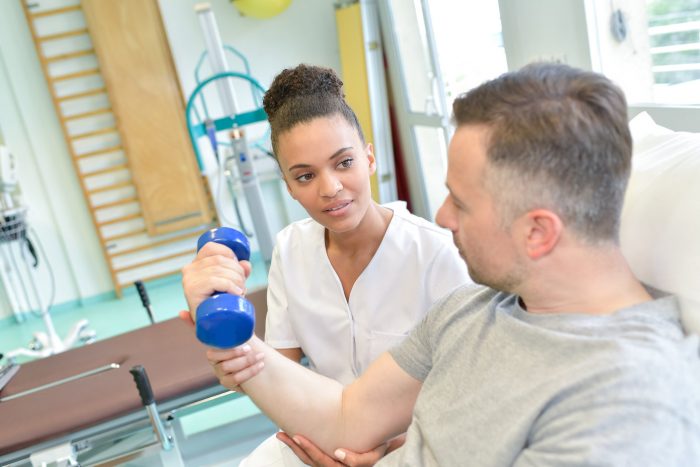Over the past decade, scientists have started to uncover the impacts exercise has on our brains. Some research has found that jogging provides a short-term mood boost by increasing endorphins and serotonin levels. We know endorphins in the brain relieve pain or stress and boost happiness. Serotonin is important for building new connections between brain cells, and increasing serotonin levels may promote neuroplasticity. This ability to reorganize our own wiring means that whoever we are, whatever we’ve become, it is never too late to change or grow.
After I had a massive stroke and my body shut down, I actually didn’t know why I wanted so badly to get up and start moving again. But I had the sense that I should. It would be around seven years later that I discovered why — doctors made the connection for me between exercise and neuroplasticity. By that time, I was making substantial progress regaining the skills, knowledge and mobility I’d lost due to stroke and aphasia. It was clear to me not only from the research but from my own experience that exercise is a powerful tool in recovery.
For anyone who has experienced a stroke or aphasia, being able to regroup and improve is a profound concept. The truth is, we can relearn the skills and knowledge we lost due to a stroke; we can replace old habits with new ones; and we can relearn language. And it’s not just a matter of taking up jogging.
Researchers believe aerobic exercises may facilitate neuroplasticity and motor recovery, but are also finding that other forms of exercise have benefits as well. Every time you work out, your muscles, fat cells, and liver release a variety of molecules into the bloodstream, enabling you to feel sharper and happier. I certainly experienced this as a stroke survivor. Trying to figure out how to regain physical mobility and language, I took a twofold approach. First, I tried all sorts of different techniques, various processes, and different exercises, including using a “brute force” method. That variety included:
- Moderate aerobic exercise, like walking briskly or jogging on a treadmill.
- Re-learning to swing a golf club.
- Simple weight lifting using barbells, exercise machines, and the bench press.
- Pilates or yoga — which also helped with cognitive practice: the teacher instructs, the student listens, and repeats the movement over and over.
- Boxing — including jabbing with my opposite arm, and doing punching bag and speed bag work.
Then, as I was able, I did as much research as I could on stroke and aphasia in order to educate myself on the best ways to recover what I’d lost. And at the same time, exercising was helping not just my body, but my mind. As I improved my physical mobility, I was also improving my ability to recall, process and use language. So the more I worked out, and the more my physical mobility and the malleability of my body improved, the more my mental skills and mood did as well.
Recent evidence backs this up, pointing to the benefits of not only aerobic exercise, but also weight-lifting and high-intensity interval training. Those who experience the biggest gains in their fitness show the biggest cognitive changes, suggesting that higher-intensity workouts provide extra benefit. The more you exercise and get your heart rate up, the more long-lasting the fitness and cognitive benefits. The mood boosts will occur no matter the intensity of the activity.
Start Slow
If you’re just getting started or are limited by age or injury, start by just walking on a treadmill or in front of your home. Even this activity can bring about improvements. The most important thing is to find something that you like doing and stick with it. I find that the best exercise program is one I enjoy doing every day, and want to go back to, again and again.
For me, it took a long time to actually see progress — it was at least five years before I saw any changes in myself. But I kept at it. I also found that there was a connection between my brain, my speaking and exercise: every aspect of my exercise regimen had an effect on my language and my mental sharpness. I could find words faster, speak more fluently, think more coherently, locate things more quickly, remember more and concentrate more. The long, gradual process seemed like a kind of osmosis: an unconscious, gradual assimilation of increased knowledge.
As a stroke survivor and a person with aphasia, I can attest to the fact that working out using an enjoyable exercise plan provides a whole host of benefits. As I continue to recover my physical mobility and language, I consider exercise a vital part of the process. Exercise not only keeps us healthy and helps us live longer, it makes us smarter and happier. If you’ve had a stroke or aphasia, it could be an even more remarkable tool, with truly beneficial results.








Read 1 comment and reply